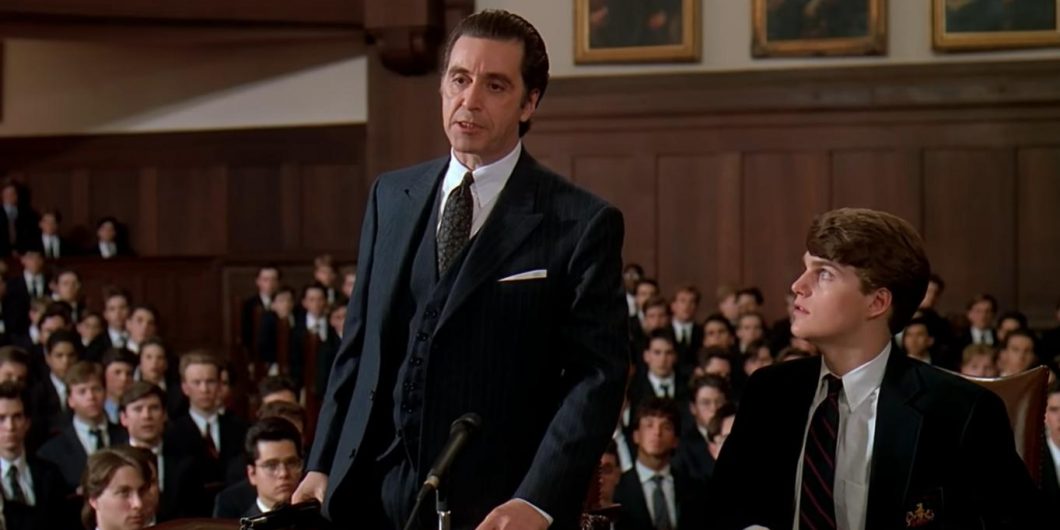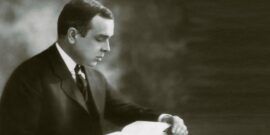Tolerance has never been maintained by "education," but by policies and institutions that offer hope for prosperity, social mobility, and accountability.
Searching for Fathers in America
Al Pacino won his Oscar for Scent of a Woman, Martin Brest’s 1992 adaptation of an Italian story, The Dark and the Honey, first adapted in Italy in 1974 by Dino Risi, whence Brest got his title. The movie, now 30 years old, is worth remembering. Aside from Pacino, it received three other major Oscar nominations, Best Picture, Best Director, and Best Screenplay, and it grossed more than $130 million worldwide. It was one of the decade’s most memorable portrayals of personal integrity and its connection to a kind of moral innocence.
Pacino plays Lt. Col. Frank Slade, US Army, retired, a manly man who prepares prep school student Charlie Simms, played by the “aw shucks” Chris O’Donnell, to become spirited, the quality most needful in a time when the young have lost confidence in their future. And he does it over the Thanksgiving Day weekend by taking him from New Hampshire to Manhattan, a necessary adventure for the boy, and one which proves lifesaving for the man.
Charlie is a West Coast kid from small-town Oregon and, at seventeen, he has to deal with the pride and wealth of the East Coast elite WASPs, a social class that ran much of America’s institutions in the 20th century but had decayed by the 90s. He is bashful where his colleagues are brash, confident, sarcastic, snobbish—in fact, he seems hardly able to say or do anything.
Harshness
What Charlie needs is to see a man of action and to be inspired by his confidence, enlightened by his experience, and tested by the fear without which he can never become a man. Charlie, we learn, was abandoned by his father; when his mother remarried, the stepfather proved to be no father at all. Needless to say, prep school fits with Charlie’s orphan boy character, but does nothing to help him either toughen up or do anything daring. He is a meritorious student, works in the library to pay tuition, but has neither friends nor mentors, and so his schooling is only making him more withdrawn.
Come Thanksgiving, Charlie is too poor to be able to go home and decides to work so he can at least afford airfare for Christmas. This is how he gets a job housesitting with the colonel, who is more a caged tiger than a housecat. In a way, this is exactly what the boy needs, a situation he cannot get out of by being nice, following the rules, or giving up. The problem is that the colonel knows the world, both the glamorous and the brutal parts. Through soldiering, he divorced himself from the American middle-class way of life; whereas the young man who wishes to become part of the professional middle class doesn’t know himself.
Now blind and stained by a bad reputation, the colonel lives with a niece’s family, whom he despises because they are mediocre. They lack the manners and wit of the upper classes, the intelligence of rare men, to say nothing of heroic virtue. We later see him at Thanksgiving dinner at his older brother’s house, where he is by turns obscene and humiliated, unwilling and unable to get along with ordinary people. His trouble is self-contempt—he experiences the paradox of morality as a proud man. He can never let people think well of him, because he guesses that that would involve condescension; if he is as impressive as he thinks he is, who are they to judge him? But he cannot live without impressing people, since he has nothing else in his life and fears he may be corrupt because he does not live an ordinary middle-class life. This has led him to disobedience and the ruin of his ambitions and, eventually, to the dangerous game that caused his blindness.
Although it somehow deals with how to fit men within the family in America, Scent of a Woman involves obscenity and is definitely not a family movie. But the protagonist played by Pacino is emphatically a moral man. He is tormented by the knowledge that his pride has led him to choose the unrighteous path at least as often as the path of righteousness. Only in the second part of the movie does it become obvious that the cantankerous old man is desperate because he cannot find a way to prove his worth by continued service. He identifies with the uniform because that was the only thing that allowed him to show devotion to America.
His great harshness toward the defenseless boy and his comparably defenseless middle-class family reminds us of some of our challenges. It is supremely difficult for a free people to reconcile spiritedness with decency. We used to call this being a gentleman, a name now usually lavished primarily on the unmanly, not to say flattering or obsequious. The colonel cannot help remembering that to face death requires great self-confidence and very exacting standards of behavior. He cannot find a match for that great self-overcoming either in American society or in his own character outside of the highly demanding circumstances of war. Peace is leading him to suicide, because he realizes he has become useless.
Luxury
It may seem odd that a man so devoted to the nobility of service in war should obsess over luxury and therefore want to visit New York City, but that is only because we have become blind to the love of the beautiful that animates all noble men. The colonel sees in everything from excellent suits and fine dining to drinks and cigars the pleasures that make a life of leisure desirable—all the things he had to do without when pressed by the necessities of war. To the ordinary man, it might seem expensive and useless to indulge such extravagant tastes. The colonel understands, however, that, as the farthest removed thing from battle, this luxury is not only the reward of heroism, but that the cultivation of taste is the safest way to put aside the bloodymindedness he learned to love by going to war.
Above all the pleasures of the table and above all the beautiful things he cherishes or admires, the colonel loves women. At his most vulgar, he talks about the pleasures of the flesh, a comic criticism of the excessive chastity of the WASP mores he remembers from his youth. His love of women points to what’s deficient in him: he doesn’t have a wife and sons to have brought up to be men. It also reveals the only thing dedicating him to life and the human good, when all his training is for death. The movie’s famous tango scene shows him at his most tender, educating a young man and a young woman, by example, about what they should expect from love and how they should behave to someone they love. It is bittersweet, since he has always failed, but that failure especially proves his devotion, since he has never given up on romance. Ultimately, women give him the most compelling evidence for some kind of providence; it’s the only subject that has him talking about God.
Luxury, finally, is also a defense against the excesses of egalitarianism in democracy. It distinguishes him from his fellow countrymen and preserves a memory of the pride of being a man. That is why the military always insists on strict propriety in dress. Without his elegance, he is reduced to being an object of pity, to which any man prefers death. Pity unmans him in a way blindness and his other failings cannot, because it denies his past. People don’t even care he was once great. They don’t care about greatness itself, finding it hard enough just to get through the day. Luxury is the mark of the hopeless romantic.
As Pacino had suggested earlier, he wishes to adopt the boy, that he may finally have a father and he himself become a father. Together, they can be reconciled to their tribulations and be reconciled to America.
Class
This is a very brief essay, so I cannot speak more about the complexity of the war hero. The movie needs this astonishing man to educate Charlie, as well as any other nice young man, about the promises and dangers of manliness, about charms and temptations and experiences their middle-class experience has not prepared them to face. Embodied in a living man, they show boys what is possible and dare them to achieve as much, or at least not to collapse in their time of trials.
Charlie needs this because his bratty colleagues and his arrogant, ungenerous prep school president have put him in a terrible predicament which threatens to destroy his career before he has even come of age. These colleagues pulled a nasty but very funny and revealing prank on the president, who is looking for revenge, but also rightly angry at the shamelessness of some of the elite he is supposed to educate. Charlie’s association with the colonel is no accident—the boy has also experienced the paradox of morality: He is blameless, but is about to be publicly humiliated, found guilty so that wealthier and more successful people can save face. Is morality supposed to lead to self-destruction?
Thus, Pacino, in his Oscar-worthy speech at the end of the movie, shows what a class act he is, and what nobility really means when he defends the boy from this corruption carried on under the forms of respectability and explicitly imitating the rule of law. He persuades the student body and, of course, the audience, not to perpetrate a cruelty on this boy whose only fault is his integrity, which doesn’t allow him to side with either of the malicious parties. Pacino expresses the paradox of morality that had haunted him all his life: He does this by first claiming that the power of morality is so great that the boy’s soul is intact despite life’s challenges only to later accuse the school of destroying the boy’s soul by their condemnation. Moral action must be in some sense done for its own sake, but if punished, will become corrupted.
Pacino speaks, he claims, in loco parentis. As he had suggested earlier, he wishes to adopt the boy, that he may finally have a father and he himself become a father. Together, they can be reconciled to their tribulations and be reconciled to America. Their friendship and the filial love that binds them throughout the funnier and the more fearful parts of the story obviously spoke to viewers about the great need for fathers in America. That need is much greater today and the movie is thus much more eloquent and more obviously a public service, giving amusement and hope during the holiday season. So enjoy the movie, consider its depth, and have a Happy Thanksgiving!



